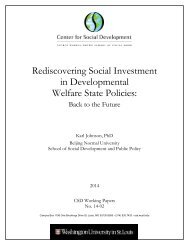Exploring and Assessing Intercultural Competence - Center for ...
Exploring and Assessing Intercultural Competence - Center for ...
Exploring and Assessing Intercultural Competence - Center for ...
Create successful ePaper yourself
Turn your PDF publications into a flip-book with our unique Google optimized e-Paper software.
- tolerance of ambiguity<br />
In addition, they cited several additional qualities:<br />
- respect (1)<br />
- reflective (2)<br />
<strong>Exploring</strong> <strong>and</strong> <strong>Assessing</strong> <strong>Intercultural</strong> <strong>Competence</strong><br />
They also cited several individual qualities about specific individuals, all positive <strong>and</strong> one<br />
negative (i.e., set in his ways):<br />
- gentle (1)<br />
- caring (1)<br />
- active (1)<br />
- helpful (1)<br />
- humble (1)<br />
- set in his ways (1)<br />
Summary<br />
By completing all items in Part II of the survey <strong>for</strong>m <strong>and</strong> leaving none blank, mentors<br />
acknowledged all 15 attributes listed. In open-ended interviews, they spontaneously confirmed 5<br />
<strong>and</strong> they identified 2 others not on the list. They also cited several positive <strong>and</strong> negative<br />
individual qualities without generalizing about them. Comparing comments between volunteers<br />
<strong>and</strong> hosts raises intriguing new questions: Are the qualities cited as important to ICC success<br />
viewed in the same way by sojourners <strong>and</strong> hosts? Do they share the same order of importance?<br />
Are any qualities which hosts consider important not considered in the same way by sojourners<br />
(<strong>and</strong> interculturalists), <strong>and</strong> vice-versa?<br />
Assertion No. 2: Learning the host language affects ICC development<br />
(About learning the host language)<br />
Discussion<br />
Spontaneous comments made by mentors concerning language <strong>and</strong> communication were:<br />
(FEMV1+I)<br />
- helps to underst<strong>and</strong> the situation on a deeper level<br />
- allows her to comprehend better<br />
- to be less judgmental<br />
(FEMV3+I)<br />
- this is one of the most important aspects<br />
- necessary, works with kids who speak only Spanish<br />
(FEMV4+I)<br />
- learning the host language is really important<br />
- otherwise would need to find alternate ways to communicate which would be difficult<br />
(FEMV5+I)<br />
- fundamental to success<br />
- admires volunteers who come <strong>and</strong> learn a new language<br />
<strong>Center</strong> <strong>for</strong> Social Development<br />
Washington University in St. Louis<br />
51
















